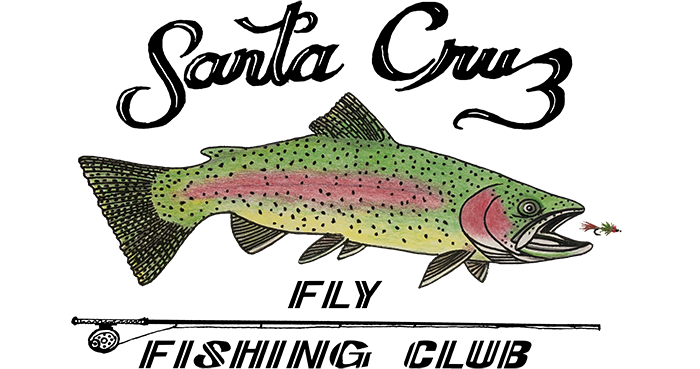What makes the Santa Cruz Fly Fishing club unique? Many of the members would say “the friendly members and the helpful culture”. This is certainly true, but not really unique since all the other clubs say the same thing. What makes us unique is the miles of public beaches that we have and the number of surf fly fishing outings. I agree with Sam Bishop when he says the Santa Cruz club has the largest number of surf fly fishers on the west coast, but even with that probably less than 10% of the club does it on a regular basis. I am hoping that some of the 90% of the club will become regulars on the beach this year.
On Saturday May 6th, the first beach fishout will take place on Rio Del Mar beach. If you are remotely interested in trying surf fly fishing, I have some suggested steps on how to get started.
- Read Sam’s excellent writeup on surf fishing on the club website.
- Go to a surf fishout and just watch from the beach. Talk to some of the members and decide if you really want to try it.
- Go to the monthly casting class at Jade Park and try out a heavier rod like a 7 or 8 wt. (ask a member to teach you how to haul).
- Borrow or purchase the necessary equipment . 8wt rod with full sink line and stripping basket.
- Find a friend or mentor to fish with you.
- Figure out the right beach and fishing conditions so that you feel safe
I am going to talk about the last three items because I want to encourage more of the club to try out surf fly fishing. Here are my thoughts:
4: Get the necessary equipment: I am making the assumption that you already have a trout rod and waders. The surf equipment is different and lately, I have seen some options that are relatively reasonable. Last summer, Emily M, showed up at a fish out with a combo from Redington called a ‘Coastal Cold Water field kit’ for just under $400. It came with a rod, reel, intermediate fly line and leader. An alternative is to come to the swap meet on May 20th and see if you can put your own equipment together. Getting an 8 wt rod not only opens up surf fishing, but it also opens up other local bass fishing and forebay striper fishing. My take is that if you are busy with family or work, fishing locally can easily double your number of fish days per year.
5: Find a friend or mentor: When learning to surf fish you should absolutely go with someone for safety, having someone there adds another layer of security. Also, I find it fun to fish the beach with others. Another line close by will not spook the fish and the biggest challenge on the beach is to find the fish and what flies they want. Having another person improves your odds of finding the successful combination. And don’t be afraid of asking another club member to be your mentor as you learn. If interested, you can talk to me at the club meeting , email scottkitayama@gmail.com or by phone/text 650 279 5871. If I can’t fish with you because of timing (I fish on weekdays), I’ll find someone to help you learn and fish with you.
6: Figure out the right conditions: I believe the luxury of local fishing is that you can fish when it is the right conditions, not when you have scheduled vacation. For someone new to surf fly fishing who is wary of big waves, there is a way to plan ahead and find conditions that are no more dangerous than wading a shallow river for trout. For me, I use the app, Windfinder, which is available on iOS and android. Here is a screen shot from the app that shows conditions on a local beach:

The image is an example of a forecast for Rio Del Mar. I have circled ideal conditions for learning to surf fish. In the image it shows the wind speeds less than 4 knot, the waves are less than 3 feet, the wave periods are about 13 seconds and it is a falling tide. If you wade into the flats and time your casts based on the level of the water, you will be able to fish the surf safely.
I will not be able to attend the May 6th outing, but there will be plenty of people there to answer questions. And please contact me if you have any questions.
Tight lines,
Scott Kitayama,
Posted on April 23rd, 2023
